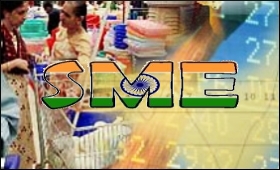|

|
FDI in retail: 30% sourcing from SMEs not India specific
|
|

|
|
| Top Stories |
 |
|
|
|
Saurabh Gupta | 28 Nov, 2011
Thirty percent procurement from Small and medium Enterprise (SME) sector is not India specific, said a white paper on cabinet decision on Foreign direct investment (FDI) in retail, released by the government recently.
In respect of proposals involving FDI beyond 51 percent, 30 percent sourcing would mandatory have to be done from SMEs/ village and cottage industries artisans and craftsmen.
Under the condition of 30 percent sourcing from small scale sector, the paper said, "30 percent sourcing is to be done from micro and small enterprises, which can be done from anywhere in the world and is not India specific."
Indian SMEs fear that this will flood the cheap Chinese products in the market and will severely harm the SME manufacturers.
The paper also cleared that in that case, it had been stipulated that 30 percent sourcing would be done from micro and small enterprises having plant and capital machinery worth USD 1 million.
'Small industries' defined as industries, which have a total investment in plant & machinery not exceeding USD 1.00 million. This valuation refers to the value at the time of installation, without providing for depreciation. "Further, if at any point in time, this valuation is exceeded, the industry shall not qualify as a 'small industry' for this purpose," it said.
This will ensure that SME sector, including artisans, craftsman, handicraft and cottage industry benefits, especially in sectors like textiles, gems and jewellery, leather and jute.
"This condition is applicable both for Multi-brand retail in all cases and for single brand retail in cases where foreign equity exceeds 51 percent," it added.
Along with this the industry experts are also questioning about the authenticity of self-certificate by the company, to ensure compliance of the condition as above, which could be cross-checked as and when required. Accordingly, the investors to maintain accounts, duly certified by statutory auditors.
"The compliance of this condition will be ensured through self-certification by the company, which could be subsequently checked, by statutory auditors, from the duly certified accounts, which the investors will be required to maintain," the paper said.
|
|
|
| |
|
|
|
|
|
|
|
|
|
|
|
|
|
|
| |
| Customs Exchange Rates |
| Currency |
Import |
Export |
US Dollar
|
₹91.35
|
89.65 |
UK Pound
|
₹125.3
|
₹121.3 |
Euro
|
₹108.5
|
₹104.85 |
| Japanese
Yen |
₹58.65 |
₹56.8 |
| As on 19 Feb, 2026 |
|
|
| Daily Poll |
 |
 |
| What is your primary "Make or Break" expectation from the Finance Minister this year? |
|
|
|
|
|
| Commented Stories |
 |
|
|
|
|
|
| |
|